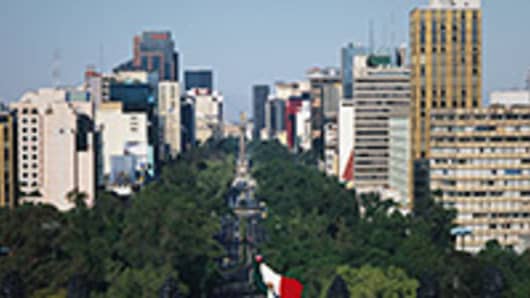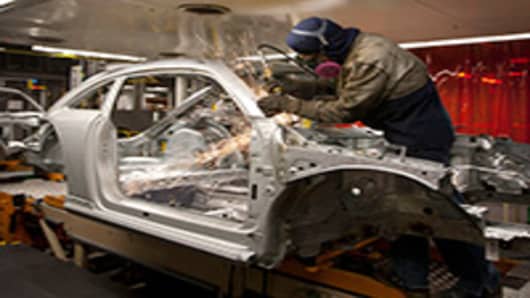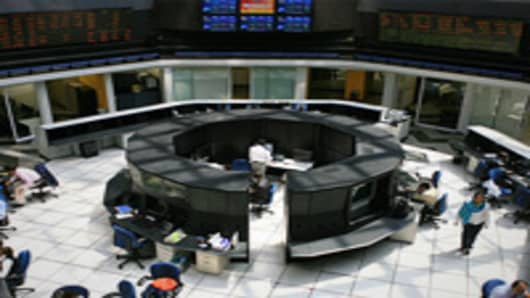Long considered a second cousin to its behemoth neighbor to the north — and a source of illegal immigration and drug violence — Mexico may have one of the most underrated and misunderstood roles in the global economy.
The reality, many analysts say, is that Mexico offers investors and businesses a land of opportunity that rivals any other emerging market.
"What's surprising — is how surprising it is that as an economic power, Mexico is under the radar for so many businesses and investors," says Jose Manuel Ramirez of tax audit firm KPMG who co-wrote a recent study on investing in Mexico.
"For many years, Mexico has been doing all it can to attract investors and has reached a high level of sophistication," Ramirez says. "There's really a lot of great possibilities there."
To make itself attractive to investors, Mexico has transformed from a small economy to an open and more diverse one. In the last 20 years, the Mexican government has made improvements to its infrastructure and fostered competition in sectors such as transportation, energy and telecommunications. (More:How to Get a Piece of Mexican Stocks)
As a result, Mexico has grown to be the 13th largest economy in the world — $2.4 trillion — and the 11th in purchasing power, according to the World Bank. The Mexican stock exchange — the Bolsa Mexicana de Valores — is valued at some $451 billion, second to only Brazil in Latin America and fifth in all of the Americas.
One of the biggest changes for Mexico has been its trade policies, says Antonio Garza, a former U.S. ambassador to Mexico and currently chairman of Vianovo Ventures, a business development firm.
"The North American Free Trade Agreement (NAFTA) in 1994 was critical to getting Mexico integrated into the global economy," Garza explains. "It opened their eyes to trade and the need to compete. It helped start the reforms and improvements to infrastructure and letting more foreign businesses come in."
With NAFTA, nearly 86 percent of Mexican exports and 50 percent of its imports are traded with the U.S. and Canada, making Mexico one of the leading exporting countries in the world. Policy changes are also making Mexico a manufacturing hub, as it's now the largest North American auto-producing nation, recently surpassing Canada and the U.S.
And investment dollars continue to pour in. General Motors has announced plans to invest $120 million in a plant in the central state of San Luis Potosi to produce the SUV crossover. And Coca Cola will invest more than $1 billion into its Mexican market this year as part of a $5 billion, 5-year investment plan for the country.
Huge economic disparity
Proximity to the U.S. is a big reason for Mexico's attraction, says George Haley, professor of marketing and international business at the University of New Haven.
"Mexico's Pacific Coast port of Lazaro Cardenas is actually closer to New York and the U.S. east coast markets than Los Angeles and Vancouver in Canada," Haley adds. "Given this geography, it's easy to see that virtually all of Mexico is a candidate for investments seeking to serve U.S. markets."
Coupled with its geography as an attraction is Mexico's workforce. With a labor pool of some 78 million people, the World Trade Organization ranks Mexican workers among the hardest-working in the world, in terms of the amount of hours worked each year.
"Mexico has a large, generally educated and trainable number of workers," Haley explains. "That's paired with a large cadre of well-educated English-speaking professional managers."
Mexico's middle class has been expanding, as immigration across U.S. borders has slowed, mainly due to the sluggish American economy, say experts. (More:Crime Explodes — But an Economy Booms)
But even as the economy grows, many Mexicans are still struggling. Mexico has the second highest degree of economic disparity in the world between the very poor and the rich, just behind Chile, according to the Organization for Economic Co-operation and Development.
And possible changes to current Mexican working laws — like more flexibility in firing, eliminating mandatory benefit packages, as well as the ability to hire workers for fewer guaranteed hours — will be attractive to businesses (though not necessarily to employees).
"Corruption is still a huge problem in Mexico. The telecommunications sector is one of the worst when it comes to corruption and payoffs."
"A lot of Mexicans are open to changing the labor laws to attract foreign business investment," says Peter Susser, chair of the international employment law practice group at Litter Mendelson. "But many others might not like the new rules and give up what they have."
To help workers, many companies are making the transition into an industrialized world by offering old world perks, says Alejandro Bustamante, senior vice president of operations in Mexico for Plantronics , an electronics firm based in Santa Cruz, California, with a manufacturing plant in Tijuana that employs 2,300 people.
"We've created a school to teach our associates how to be parents to allow them more time to concentrate on their families," Bustamante explains. "We've also brought a museum and symphony to the plant and we try to get our workers involved in the community. We are very focused on our workers and other firms are doing the same."
There are of course, major caveats for any type of business investment in Mexico. While Mexico avoided a major setback from the global recession, it suffered a slowdown that could happen if another recession hits. That's because of its dual-edged sword of being tied to the U.S., says Antonio Garza.
Predictions say Mexico will pass Brazil
"The U.S. economy is key for Mexico," Garza explains. "It's not the only factor, but to think that a neighboring country as big as the U.S. wouldn't have an impact on Mexico if there's economic trouble is wrong."
Besides outside forces, internal problems in Mexico can't be ignored, says Josh Miller, general manager in Mexico for Control Risks, a global risk consultancy firm.
"Corruption is still a huge problem for businesses in Mexico, as are extortion threats and hijacking along the production chain," Miller says. "Telecommunications is one of the worst sectors when it comes to corruption and payoffs. That raises prices and costs for firms."
And there's the deadly violence from the drug cartel wars that's killed some 48,000 people during the last five years. But the murders, as awful as they are, don't create a full picture of Mexico, says George Haley. (More:What's the Next Global Manufacturing Superpower?)
"It's having an affect and can't be dismissed, but it's limited to about five of the country's 31 states," Haley says. "Mexico is perceived as an extremely violent country but its crime rate, even with the cartel violence, is about middling for Latin America and the Caribbean."
For all its problems, experts say Mexico is still a good investment bet. A return of the Institutional Revolutionary Party (PRI) to presidential power has many believing the march toward business reforms will continue—as will the fight to control the drug lords.
Meanwhile the economy keeps growing. One analysis says Mexico's economy could surpass Brazil as the number one economy in Latin Americain 10 years. Goldman Sachs has predicted that Mexico could be 5th largest economy in the world by 2050.
In the end, analysts say, the question is really not why — but why not? — invest in Mexico.
"There's a lot of reform ahead including labor, energy, along with more transparency and stability in the government," says Garza, former U.S. ambassador to Mexico. "If you ask me, the big risk for investors is not being in Mexico."





